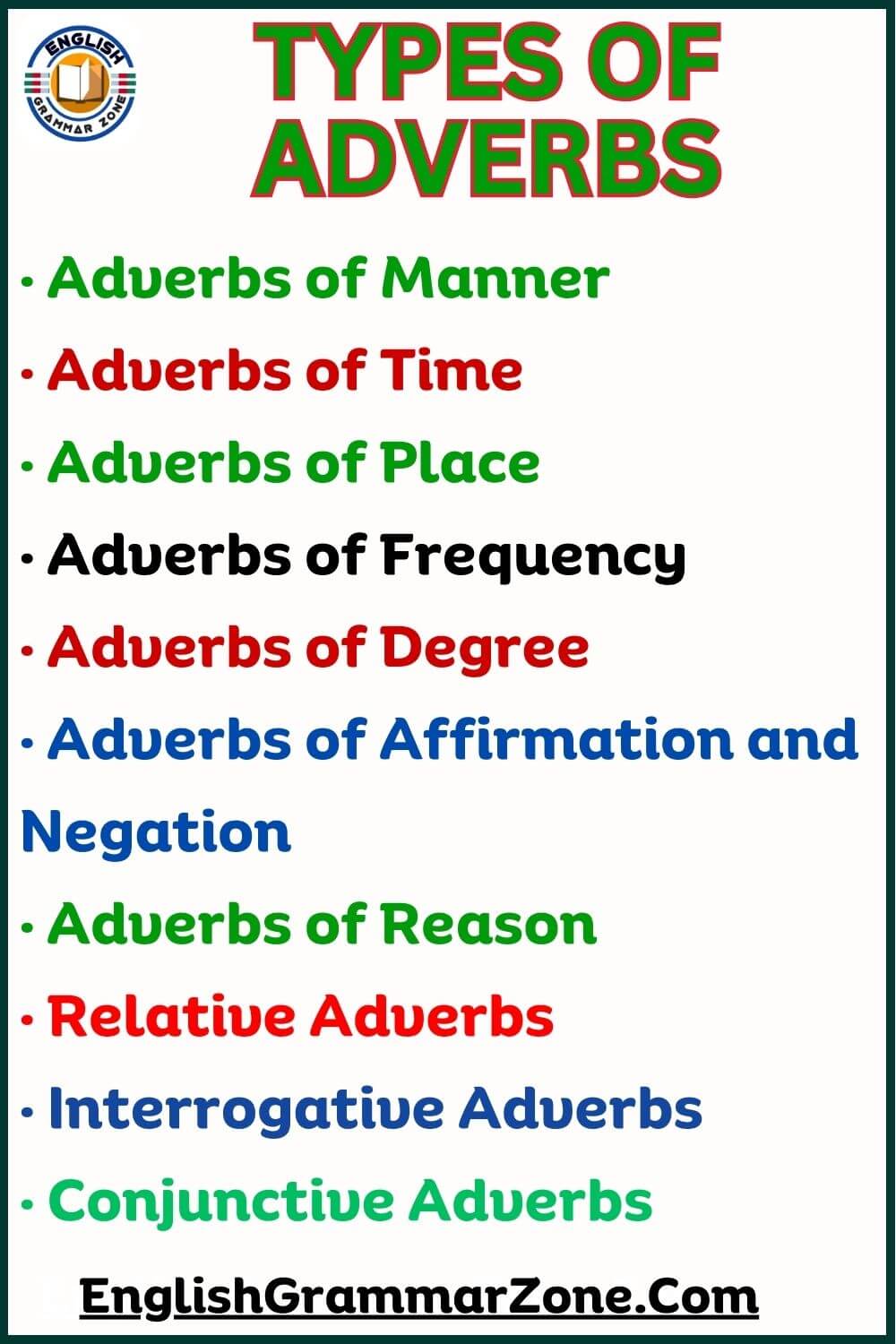Types of Adverbs
- Adverbs of Manner
- Adverbs of Time
- Adverbs of Place
- Adverbs of Frequency
- Adverbs of Degree
- Adverbs of Affirmation and Negation
- Adverbs of Reason
- Relative Adverbs
- Interrogative Adverbs
- Conjunctive Adverbs
Adverbs Definition:
An adverb is a word that modifies or describes a verb, an adjective, another adverb, or even an entire sentence. Adverbs often tell us how, when, where, to what extent, or under what conditions something happens.
Adverbs of Manner
Definition: Adverbs of manner describe how an action is performed.
Example Sentences:
- She sings beautifully.
- He ran quickly to catch the bus.
- The children played happily in the park.
- The teacher explained the lesson clearly.
- The baby slept peacefully.
- She speaks softly on the phone.
- He waited patiently for his turn.
- They danced gracefully at the event.
- The artist painted skillfully.
- The dog barked loudly.
Adverbs of Time
Definition: Adverbs of time indicate when an action occurs.
Example Sentences:
- She will arrive tomorrow.
- He called yesterday.
- They are leaving soon.
- We met last week.
- The train departs now.
- I’ll see you later.
- They have been friends since childhood.
- She always finishes her work early.
- The event was held recently.
- The results will be announced today.
Adverbs of Place
Definition: Adverbs of place tell us where something happens.
Example Sentences:
- She looked everywhere for her keys.
- The kids are playing outside.
- The cat is hiding under the bed.
- He stood near the door.
- They traveled abroad for the summer.
- Please come here.
- The bookstore is downstairs.
- She sat beside him.
- The bird flew above the trees.
- The office is located downtown.
Adverbs of Frequency
Definition: Adverbs of frequency describe how often something happens.
Example Sentences:
- She always wakes up early.
- He never misses a meeting.
- They usually go to the gym after work.
- I often read before bed.
- We sometimes eat out on weekends.
- She rarely gets angry.
- They frequently visit their grandparents.
- I occasionally watch movies.
- He seldom makes mistakes.
- We hardly ever go to the beach in winter.

Adverbs of Degree
Definition: Adverbs of degree express the intensity or degree of an action, adjective, or another adverb.
Example Sentences:
- She is very happy with her results.
- He was too tired to continue.
- The movie was extremely interesting.
- She is quite talented.
- The soup is almost ready.
- The weather was so cold yesterday.
- He was just in time for the meeting.
- She is barely able to stand.
- The room was completely silent.
- He is entirely responsible for the project.
Adverbs of Affirmation and Negation
Definition: Adverbs of affirmation confirm or assert the truth of a statement, while adverbs of negation deny it.
Example Sentences:
- Affirmation:
- She will certainly pass the exam.
- He surely knows the answer.
- They indeed enjoyed the concert.
- We will definitely be there.
- She truly believes in herself.
- Negation: 6. I will never forget your kindness. 7. They didn’t go to the party. 8. He scarcely had time to eat. 9. We can hardly hear you. 10. She no longer lives here.
Adverbs of Reason
Definition: Adverbs of reason explain why something happens.
Example Sentences:
- He was late because he missed the bus.
- She studied hard therefore she passed the exam.
- He was tired so he went to bed early.
- Since it’s raining, we’ll stay indoors.
- They moved to the city due to better job opportunities.
- Thus, they decided to cancel the trip.
- He was not feeling well, hence he stayed home.
- Consequently, they had to reschedule the meeting.
- She missed the deadline because of traffic.
- The match was postponed as it was raining.
Relative Adverbs
Definition: Relative adverbs introduce a clause and refer back to a noun or pronoun.
Example Sentences:
- This is the place where we first met.
- Do you remember the time when we went to the beach?
- That is the reason why she left early.
- The park where we played is now closed.
- I’ll never forget the day when I graduated.
- Can you tell me the reason why they are late?
- The hotel where we stayed was amazing.
- That was the year when I moved to the city.
- She explained the reason why she changed her job.
- This is the spot where we buried the time capsule.
Interrogative Adverbs
Definition: Interrogative adverbs are used to ask questions about time, place, reason, or manner.
Example Sentences:
- When will the meeting start?
- Where did you find this book?
- Why are you upset?
- How did you solve the problem?
- When is the deadline for the project?
- Where is the nearest gas station?
- Why did she leave so early?
- How do you make this dish?
- When are you going on vacation?
- Where is your office located?
Conjunctive Adverbs
Definition: Conjunctive adverbs connect two independent clauses, showing the relationship between them.
Example Sentences:
- He didn’t study; therefore, he failed the exam.
- She loves chocolate; however, she’s allergic to it.
- We were late; nevertheless, we still got good seats.
- The weather was bad; consequently, the event was canceled.
- He was tired; thus, he went to bed early.
- The project was challenging; however, they completed it on time.
- She was unwell; therefore, she couldn’t attend the meeting.
- He didn’t like the movie; instead, he preferred reading a book.
- They were hungry; so, they ordered a pizza.
- The traffic was heavy; as a result, they arrived late.
Read More
1. List Of Possessive Pronoun With Example Worksheet

